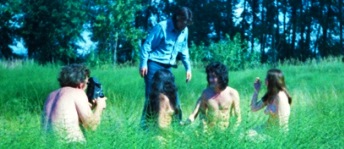FEATURE FILMS MADE IN VANCOUVER
Prepared for Chuck Davis and The Greater Vancouver Book — June, 1995
[Published in 1997 by The Linkman Press]
By MICHAEL WALSH
[PART 19: MIDNIGHT MADNESS]
THE GREATER VANCOUVER BOOK FEATURE FILM FESTIVAL
THIS IS YOUR PROGRAM guide to a series of 20 movie retrospectives. Together, they include all of the theatrical feature films made in Vancouver and in release as of June, 1995. (Our current program does not include the made-for-TV pictures.) Though we've tried to be as complete as possible, we've almost certainly missed a few. If you know of any, please let us know. [Readers of this website who wish to get in touch with additions or corrections can reach me by using the Reeling Back Contact Me button.]
Our notes on each picture include its title (and any alternate titles), its year of release, the director, leading players and a brief description.
Our show continues with . . .
PROGRAM 19. MIDNIGHT MADNESS.
THOUGH EVERY FILM-MAKER is a visionary, some cinematic visions play best after hours. Not intended for mass audiences, they are either too personal, too quirky, too explicit or too outrageous for mainstream filmgoers. Among the Vancouver-made candidates for cult film status are:
THE PLASTIC MILE (1969; d. Morrie Ruvinsky) with Jace Vander Veen, Pia Shandel, Beverlee Miller, Sylvia Spring. In this movie about moviemaking, a director (Vander Veen) is emotionally torn between his pregnant wife (Miller) and his leading lady (Shandel) during the filming of his magnum opus in Vancouver's Starlite Studios.The sexual content in Montreal-born Ruvinsky's directorial debut feature became the focus of a censorship crisis that prevented its scheduled world premiere at 1969's Vancouver International Film Festival. Recut and retitled twice, it failed to find commercial success as either She's a Woman or The Finishing Touch.
MASTER OF IMAGES (1972; d. Byron Black) with Byron Black, Lulu Ulul (Yoshi Yoshihara), Niels Ashby. Puckish conceptual artist Black offered his personal take on the state of cinema with this non-linear tale of a young woman (Ulul) who flees the city for some karmic readjustment. Fetching up on B.C.'s Lasqueti Island, she encounters the film's titular Master (Black) and experiences a kaleidoscopic 1960s-style happening. Released with its own artistic "manifesto," the Texas-born Black's directorial debut feature was billed as "a transcendental satire on the Hollywood film syndrome," a warning that it had no plot.
SEXCULA (1973; d. John Holbrook) with Debbie Collins, Jamie Orlando, John Alexander. Seeking personal satisfaction, Dr. Fellatenstein (Orlando) constructs Frank (Alexander), a generously equipped monster. When he fails to function, she asks her cousin, the vampire Sexcula (Collins), to assist in arousing Frank's interest. Aimed at the new U.S. market for hardcore pornography, this triple-X comedy was the only directorial credit for Vancouver cinematographer Holbrook (credited as Bob Hollowich). It disappeared almost immediately. Rediscovered in 2013, it was released on DVD.
THE HOLY ASSASSIN (1974; d. Byron Black) with Byron Black, Lulu McMovie (Yoshi Yoshihara), Joan MacIntyre. A metaphysical criminal from another dimension hides out in a hippie commune somewhere in Vancouver's Kitsilano neighbourhood. Inspired by Nicolas Roeg's 1970 feature Performance, cinema provocateur Black added a science-fictional twist to the visual experimentation in his second feature. As "The Baron Infinity," Black went on to a successful career as a performance artist.
BIG MEAT EATER (1982; d. Chris Windsor) with George Dawson, Andrew Gillies, Clarence "Big" Miller. Though his suburban butcher shop is targeted for expropriation, the small businessman (Dawson) hires a beefy apprentice (Miller) with a nefarious interest in meat processing. The comedy plot is complicated by the arrival of space aliens. Cannibalism and small appliance repair are featured in this deliberate attempt by SFU Film Workshop alumnus Windsor to create a suburban midnight movie musical. Filmed on White Rock, B.C. locations, it is also known as The Butcher of Burquitlam.
TERMINAL CITY RICOCHET (1989; d. Zale Dalen) with Peter Breck, Jello Biafra, Mark Bennett, Germain Houde. In the post-apocalyptic title town, a newsboy (Bennett) falls afoul of the mayor (Breck) and his ruthless henchman (Biafra). A social satire, Dalen's third theatrical feature joins punk rock rebellion with urban discontent to give a sci-fi sensibility to a film aimed directly at the inner city cult crowd.
FLESH GORDON MEETS THE COSMIC CHEERLEADERS (1990; d. Howard T. Ziehm) with Vince Murdocco, Robyn Kelly, Tony Travis. In this loose sequel to the 1974 softcore serial spoof Flesh Gordon, an interplanetary hero (Murdocco) is drafted by scantily-clad aliens who need him to restore pleasure to their world. Perhaps in recognition of the fact that a B.C. businessman had provided completion funding for his first Flesh feature, director Ziehm set up his production studio in the Vancouver warehouse previously used by the MacGyver TV series.
The above is Part 19 of a 20-part restoration of a Greater Vancouver Book article by Michael Walsh originally published in 1997. For additional information on this archived material, please visit my FAQ.
Afterword: Postings in this Feature Film Festival series include:
|
Part 1 [Introduction & Vancouver Firsts] Part 2 [God's Country] Part 3 [Cybercity] Part 4 [Documentary] Part 5 [Youthquakes] Part 6 [Lovely Couples] Part 7 [Encore] Part 8 [Self-Portraits] Part 9 [Encore II] Part 10 [Local Heroes] |
Part 11 [Directorial Tribute - Jack Darcus] Part 12 [The B-List] Part 13 [Things that Go Bump in the Night] Part 14 [Cabin Fever Dreams] Part 15 [Law and Order] Part 16 [Terminal City Comedy Club] Part 17 [Man's Best Friends] Part 18 [In Other Words] Part 19 [Midnight Madness] Part 20 [On the Road Again] |
See also: The seven-part series "Feature Films Made In Vancouver and B.C." from The Vancouver Book published in 1976 — Part 1 [Introduction; the Silents]; Part 2 [Outside Vancouver, 1932-38]; Part 3 [Outside Vancouver, 1942-75]; Part 4 [Vancouver, 1932-68]; Part 5 [Vancouver, 1969-71]; Part 6 [Vancouver, 1972-75]; Part 7 [Miscellany & Sources].
